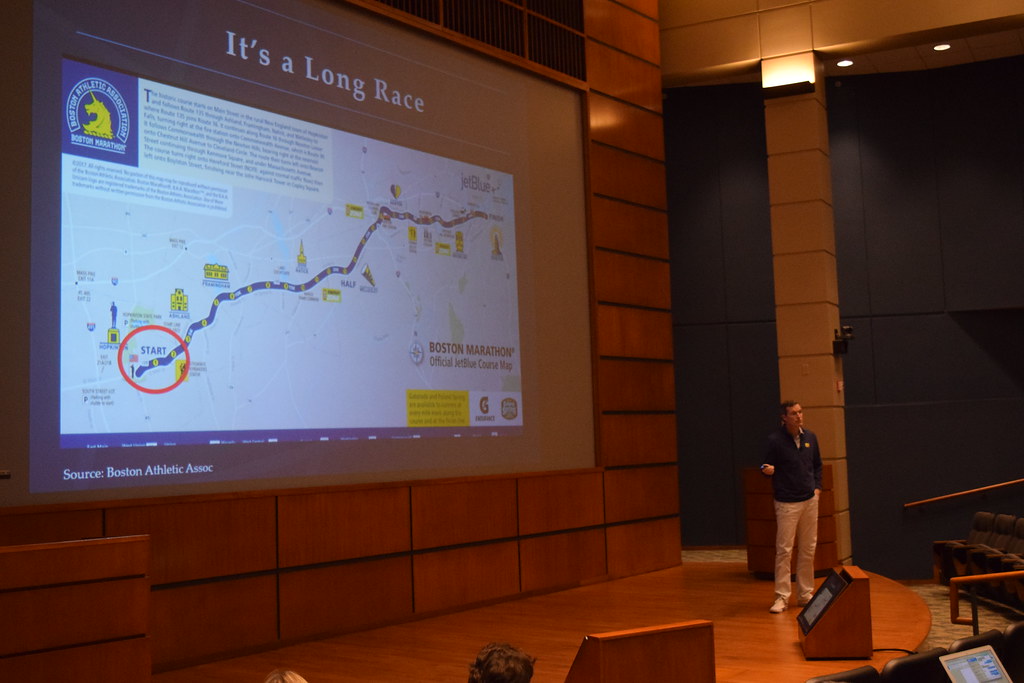
On Nov. 14, NDIGI Managing Director Kevin Burke hosted an Investment Careers Discovery Night. The objective of the event was to provide students with a more comprehensive understanding of the career options available to them after graduation and the steps they can take now to prepare for those careers. The event was open to students of all majors in order to encourage the idea that investors are multidisciplinary.
The Industry at a Glance
For those unfamiliar with the landscape of the investment industry, Burke began by providing an overview of the industry. When determining which type of job will be the right fit, he believes students should focus on three major factors: the quality of the work and the challenges it will offer, the diversity and applicability of skills it will teach, and the culture of the company.
Burke used the Principal-Agent Relationship to explain the investment industry to the students. Principals have the capital and the resources to make an investment while agents, or advisors, act on behalf of the principal and give them investment advice. Because principals have the resources and are looking to buy assets or investments, they are referred to as “buy-side”. Meanwhile, agents are typically firms that consult or pitch/sell assets or opportunities, and are therefore referred to as “sell-side”. The buy-side and sell-side are most closely linked to the investment management and investment banking roles respectively. The relationship between the two shows the mutual dependence between the principal and the agent.
Burke then delved into the diverse career paths students could choose to follow using this principal-agent model.
Investment Banking Analyst
Students wishing to enter the financial services industry tend to think that a position as an investment banking analyst is the default starting point. Investment banking analysts may also be called sell-side analysts as they work for the organization that is selling investment advice or particular securities. These analysts work as members of an investment team to perform a valuation of the company or asset including an analysis on the company or asset, its industry and its competitors. This detailed report, including financial models, is then shared with potential investors. The investment banking analyst position is high reward but also a high pressure environment not suited to match each individual’s preferences. Therefore, it is important to note that investment banking analysts are not the only positions available to those pursuing a career in investing.
Burke discussed a variety of different types of positions, including those that fall within the categories of investment management, business development and fund marketing, and business analysts.
Investment Management Analyst
Investment management analysts or buy-side analysts work for the organization that is buying the investments. These analysts must have strong technical and critical thinking skills and must have an innate understanding of how to value a company. They gather data about company and the industries and markets they operate in, which helps them make the investment decision and achieve their investment goals.
Business Development and Fund Marketing
Individuals who work in business development and fund marketing have to understand and communicate the portfolio’s performance to their clients. They must have strong communication skills and be well-versed in the markets in order to find potential investors and to keep their current clients up to date with fund performance and market trends .
Business Analyst
In contrast, the business analyst role is less market-oriented. These individuals play a vital role in the operations of a business. They support both the business development and investment analysts while providing critical analytics necessary to the success of the business.
The positions Burke described vary in their level of focus on markets, their emphasis on qualitative or quantitative work, and the flexibility of their schedules. In showing students the available options, Burke hopes to enable students to find what they want to do by eliminating what they do not want to do.
How to Prepare to Begin a Career
Academics
Burke stressed the importance of learning the fundamental concepts while in school and understanding the multifaceted ways in which they will be applicable in the industry. For example, knowing how to value an asset is useful in a career as an entrepreneur, advisor, or investor. By confronting intellectual challenges each day as well as gaining skills that are transferable, students will ultimately prepare to be successful in whichever career path they pursue. A broader skill-set leads to more freedom in choosing a career.
Interpersonal Relationships & Networking
However, comprehension of academic concepts is not the only important component of obtaining a job. Burke noted that an individual’s emotional quotient is just as valuable as an individual’s intelligence quotient. An ability to read situations, to interact clearly and respectfully with others, and to possess strong self-awareness is critical to prolonged success within the industry. Burke offered some of his own personal tips for maintaining strong relationships in the industry, such as sending handwritten thank you notes.
Interviews
When approaching an interview, it is essential to prepare ahead of time. Students should consistently be working to stay up to date with the industry and its trends. They should aim to know which sectors of the industry are flourishing right now and which are likely to lose favor.
Burke urges students to “keep a finger on the pulse of the markets” by reading a large breadth of materials. In particular, he recommends “The Wall Street Journal,” “The Economist” and the Bloomberg app. He also recommends podcasts such as “Invest Like the Best” and “Capital Allocators.”
As students look toward graduation and securing a career full of opportunities for growth, it is beneficial to look ahead. Burke hoped that in hosting a career discovery night, he would help students to do so.